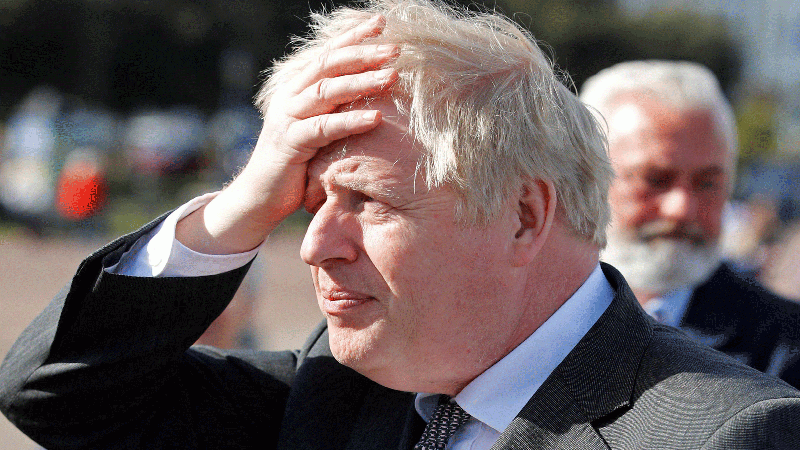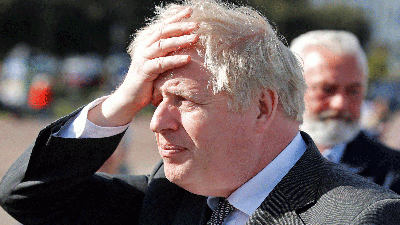In July 2019, the current British Prime Minister, Boris Johnson, took office following Theresa May, who failed to finalize the Brexit deal. It appears that July 2022 may witness the final chapter of Johnson's term. In the last few hours, resignations have flooded Johnson's government, paving the way for its disintegration and his removal from power, yet he has expressed his determination to cling to authority.
From the very first day of his premiership, scandals and troubles have shadowed the British Prime Minister. Just hours after taking over the government on July 24, 2019, he appointed his brother Jo as a minister, a decision that sparked outrage among many in Britain.
However, this story pales in comparison to what has become known as the "Corona Parties" or "Lockdown Parties" that Johnson held at 10 Downing Street (the British government's headquarters), in violation of the lockdown rules his government imposed on the public as part of the fight against COVID-19, which many deemed harsh.
This scandal has also been dubbed "Partygate," reminiscent of the famous "Watergate" scandal. The story began when the first party was organized in May 2020, but it wasn’t until January of this year that reports emerged about that event, revealing that there were at least 16 parties and gatherings, one of which was held to celebrate Boris Johnson's birthday. One report mentioned that dozens attended a party at the Prime Minister's residence, after which pressure began to mount on Johnson.
The first to act against Johnson were his adversaries from the opposition Labour Party in Parliament, who demanded he be questioned and stated that he should resign if it was proved he broke the law. In February, the British police questioned the Prime Minister as part of an investigation into the parties. Johnson attempted to defuse the anger of both politicians and the public by asserting initially that he did not believe he had broken any laws.
When that tactic failed, he attempted to issue successive apologies, even repeating his apology several times in a single parliamentary session, yet this did not succeed in alleviating the crisis. In April, the British police issued fines to Johnson and his Chancellor of the Exchequer, Rishi Sunak, and shortly after, Johnson announced his full apology for the events. The leader of the opposition Labour Party, Keir Starmer, called for the resignation of both Johnson and Sunak, asserting they had "repeatedly lied to the British public."
The number of parties was significant. In May, a government report recommended that senior British officials be deemed guilty regarding the parties. The report investigated 16 gatherings that Johnson attended with his staff during 2020 and 2021. The British Prime Minister tried to justify the parties, claiming they were organized to appreciate the efforts of staff during the COVID-19 pandemic, but the report confirmed that the gatherings blatantly violated the social distancing protocols set by the government itself.
In early June, it was anticipated that the Conservative Party would seek to oust Johnson through a vote of no confidence, after dozens of party members called for it. However, he survived the vote. It was believed that Johnson had evaded political dismissal for some time due to the party system that shields him from any confidence withdrawal attempts for another year.
However, the situation did not end there. In late June, the Conservative Party lost two parliamentary seats in by-elections in traditional strongholds. Following the losses, the party leader Oliver Dowden resigned in a carefully crafted letter, hinting that he believed Johnson should take responsibility for the events.
In early July, the fabric of Johnson's government began to unravel, with the resignations of Health Minister Sajid Javid and Chancellor Rishi Sunak, with Javid stating in his resignation letter: "It is clear to me that the situation will not change under your leadership, and I have lost confidence in you." Following that, a wave of resignations ensued, including six ministers: the Minister of State for Children and Families, a deputy Minister of State for Transport, the Justice Minister, the Housing Minister, in addition to several officials from the party, bringing the total number of resignations to 27 by the evening of Wednesday.
A report by Sky News indicated that Johnson's journey in power was fraught with risks, even before the parties were exposed, as 2020 saw the resignation of Dominic Cummings, Johnson's chief advisor and strong ally. Cummings later stated that Johnson lacked competence and that the Prime Minister's wife attempted to appoint senior staff in the government.
Sky News reported that members of Parliament from the Conservative Party are making efforts to once again push for a no-confidence vote against Johnson following the "political earthquake" represented by the successive resignations. According to a member of the party's 1922 Committee, party rules may change in preparation for another no-confidence vote.




